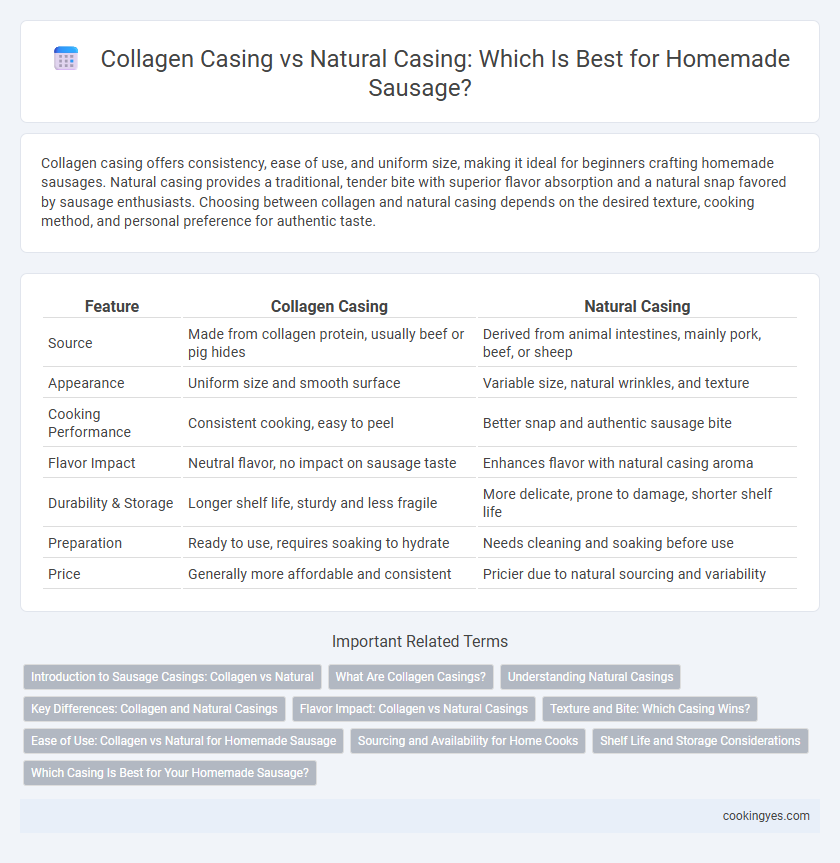Collagen casing offers consistency, ease of use, and uniform size, making it ideal for beginners crafting homemade sausages. Natural casing provides a traditional, tender bite with superior flavor absorption and a natural snap favored by sausage enthusiasts. Choosing between collagen and natural casing depends on the desired texture, cooking method, and personal preference for authentic taste.
Table of Comparison
| Feature | Collagen Casing | Natural Casing |
|---|---|---|
| Source | Made from collagen protein, usually beef or pig hides | Derived from animal intestines, mainly pork, beef, or sheep |
| Appearance | Uniform size and smooth surface | Variable size, natural wrinkles, and texture |
| Cooking Performance | Consistent cooking, easy to peel | Better snap and authentic sausage bite |
| Flavor Impact | Neutral flavor, no impact on sausage taste | Enhances flavor with natural casing aroma |
| Durability & Storage | Longer shelf life, sturdy and less fragile | More delicate, prone to damage, shorter shelf life |
| Preparation | Ready to use, requires soaking to hydrate | Needs cleaning and soaking before use |
| Price | Generally more affordable and consistent | Pricier due to natural sourcing and variability |
Introduction to Sausage Casings: Collagen vs Natural
Sausage casings are essential for shaping and cooking sausages, with collagen and natural casings being the primary options. Collagen casings, made from animal protein, offer uniformity, easy handling, and consistent sizing, ideal for homemade sausage production. Natural casings, sourced from animal intestines, provide superior texture and flavor but require careful preparation and handling for optimal results.
What Are Collagen Casings?
Collagen casings are edible sausage casings made from the collagen protein extracted primarily from beef or pork hides, offering a uniform shape and easy peeling for homemade sausage production. These casings provide consistent thickness, enhanced durability, and are widely used for their convenience and hygienic properties compared to fragile natural casings. Sausage makers value collagen casings for their ability to improve cooking performance and reduce preparation time without compromising flavor.
Understanding Natural Casings
Natural casings, derived from the intestines of animals such as hogs, sheep, or cows, provide a traditional, edible outer layer that enhances the texture and flavor of homemade sausage. Unlike collagen casings, which are manufactured from processed animal hides, natural casings offer superior breathability and elasticity, allowing sausages to expand evenly during cooking. The porous nature of natural casings supports fermentation processes in sausage making, resulting in richer taste profiles and a more authentic culinary experience.
Key Differences: Collagen and Natural Casings
Collagen casings, made from processed animal proteins, offer uniform size, easy handling, and consistent cooking results, making them ideal for homemade sausage production. Natural casings, derived from the intestines of animals such as pigs or sheep, provide a traditional texture and enhanced flavor but require more careful preparation and handling. The key differences lie in durability, texture, and ease of use, with collagen casings favored for convenience and natural casings prized for authentic taste and snap.
Flavor Impact: Collagen vs Natural Casings
Natural casings, derived from animal intestines, enhance homemade sausage flavor by allowing smoke and seasonings to penetrate more deeply, creating a richer and more authentic taste experience. Collagen casings, made from processed animal proteins, provide a consistent texture and appearance but tend to impede flavor absorption, resulting in a milder taste profile. Choosing natural casings can significantly elevate the overall sensory appeal of homemade sausages through their superior flavor impact.
Texture and Bite: Which Casing Wins?
Collagen casings offer a uniform, consistent texture that delivers a firm bite, making them ideal for homemade sausages requiring precision. Natural casings provide a tender, slightly chewy bite with a unique snap that many sausage enthusiasts prefer for authentic texture. When choosing between the two, collagen casings excel in reliability and ease of use, while natural casings win for traditional texture and distinctive bite quality.
Ease of Use: Collagen vs Natural for Homemade Sausage
Collagen casings offer superior ease of use for homemade sausage due to their uniform size, consistent quality, and ready-to-use nature, eliminating the need for extensive soaking or rinsing. Natural casings require more preparation time, including cleaning and soaking, and demand greater skill to handle without tearing, which can be challenging for beginners. Choosing collagen casings streamlines the sausage-making process, making it more accessible for home cooks seeking convenience and consistent results.
Sourcing and Availability for Home Cooks
Collagen casings offer consistent quality and easy sourcing through online retailers and specialty cooking stores, making them highly accessible for home cooks. Natural casings, sourced from animal intestines, often require purchasing from local butchers or specialty meat suppliers, which can be less convenient and vary in availability based on location. Home cooks prioritize collagen casings for their reliability and ease of storage, while natural casings appeal to those seeking traditional texture and flavor despite less predictable sourcing.
Shelf Life and Storage Considerations
Collagen casing offers a longer shelf life for homemade sausages due to its uniformity and resistance to drying out, typically lasting several weeks when refrigerated properly. Natural casings, made from animal intestines, have a shorter shelf life and require more careful storage, often needing refrigeration and quicker consumption to prevent spoilage. Proper handling and storage conditions, such as vacuum sealing and maintaining consistent temperatures, are crucial for both casing types to maximize freshness and safety.
Which Casing Is Best for Your Homemade Sausage?
Collagen casings offer consistent thickness, easy handling, and uniform cooking, making them ideal for beginners in homemade sausage making. Natural casings, derived from animal intestines, provide a classic snap and enhance flavor but require more preparation and care. Choosing between collagen and natural casing depends on your priority for texture, ease of use, and authenticity in homemade sausage production.
Collagen casing vs natural casing for homemade sausage Infographic

 cookingyes.com
cookingyes.com